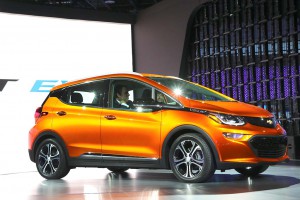
Could this be the first approved autonomous vehicle on U.S. roadways? GM prepped the new Bolt EV to accept self-driving technology.
It appears that Google won’t be the only company looking to test autonomous vehicles on U.S. roads, General Motors and Lyft may be looking to put several self-drivers into service in the months ahead.
The two companies are planning to test a fleet of autonomous vehicles that will likely include the new Chevrolet Bolt EV as they move forward with their efforts to create a driverless ride-sharing fleet of cars, according to multiple news reports.
No cities or vehicles beyond the possibility of the Volt have been selected, according to multiple reports. The Bolt would likely be part of the plans as the EV was designed to be used for testing fully autonomous technologies.
So far, only a handful of states, including Nevada, Michigan, California and Florida, have actually set down their own rules on self-driving cars. The National Highway Traffic Safety Administration is in the process of trying to establish a set of federal regulations for testing. Currently, they are accepting public comment on the idea.
GM, which invested $500 million in Lyft earlier this year, has been on a crusade to become a leader in autonomous vehicle technology. The Detroit-based automaker offered $1 billion for Cruise Automation, a start-up company in San Francisco that is creating technology used for autonomous vehicles.
(Millennial interest in vehicles rises with the level of tech inside it. For more, Click Here.)
Taggart Matthiesen, Lyft self-driving technology director, said Lyft and GM want to validate the Cruise Automation system before taking it on public roads, according to the Detroit Free Press.
The automaker already announced plans to test its plug-in hybrid Chevy Volt’s autonomous capabilities at its Tech Center in Warren, Michigan. The test vehicles would be limited to the company’s 600-acre campus and would operate much like Lyft operates now: make a call and a car comes to get you.
For now, the two companies are still in the exploratory stage on the project, and GM has never publicly acknowledged if it has tested any of its autonomous vehicles on public roads. Google, which has been testing its vehicles for some time now on its campus as well as in Mountain View, California, the city where it is headquarters.
Recently, the tech giant announced plans to expand its on-road testing program to other cities, including Phoenix, Arizona; Austin, Texas; and Kirkland, Washington. Swedish/Chinese carmaker Volvo also announced plans to begin testing its autonomous vehicles in China.
(Click Here to see more about GM’s efforts to expand its car- and ride-sharing services.)
Currently, Google’s test vehicles have drivers in them and it would appear that the GM/Lyft effort would be forced to follow the same rules, although eventually, like Google, it would like to eliminate the driver from the equation altogether.
Like many of its competitors, GM has been exploring and investing in various “mobility” enterprises, ranging from ride-sharing to car-sharing. The automaker unveiled plans for its own car-sharing service it calls Maven.
“With the launch of our car-sharing service through Maven, the strategic alliance with ride-sharing company Lyft, and building on our decades of leadership in vehicle connectivity through OnStar, we are uniquely positioned to provide the personalized mobility services our customers expect today and in the future,” GM President Dan Ammann said at the time of launch.
The company is not saying how much it will spend to get Maven going, though it did say the car-sharing firm will have a staff of 40 employees who have been hired from the connected car field, as well as from Sidecar, Google and rival car-sharing service Zipcar.
(To see more about GM’s newly launched car-sharing service, Click Here.)
The new service operates in three U.S. cities: New York, Chicago and Ann Arbor, Michigan as well as in two German cities: Frankfurt and Berlin. All of these efforts are an attempt by GM – and other automakers – to get a piece of the $5 billion personal mobility market: a market that is growing.
